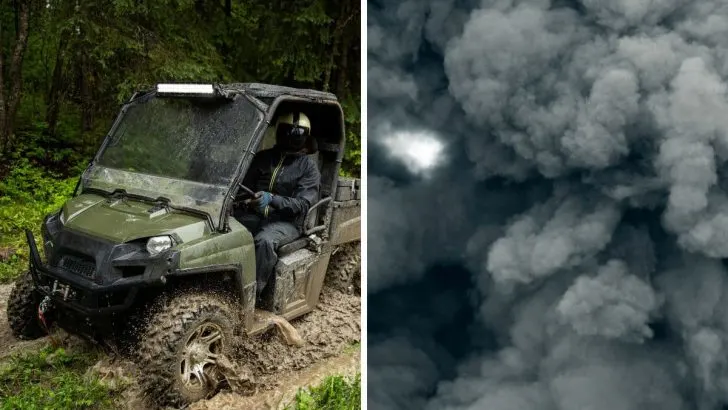The Polaris Ranger is made to be super tough and durable on off-road terrain, but like all cars, they occasionally encounter problems, especially if you’re off-roading all the time. If there’s an issue with the exhaust, your Polaris might emit black smoke, which can be alarming.
Your Polaris Rangers will emit black smoke in the exhaust because it’s burning fuel inefficiently, which is often caused by a clogged air filter, worn piston rings, or clogged/faulty fuel injectors. Some other causes include engine deposits, contaminated fuel, or worn-out engine oil.
There are many reasons why your Polaris Ranger may emit black smoke in the exhaust. Read on and learn why your Polaris Ranger emits black smoke in the exhaust.
5 Reasons Your Polaris Ranger Emits Black Exhaust Smoke in Exhaust
You should be aware of the potential causes of your Polaris Ranger emitting black smoke in the exhaust to take action before it becomes a bigger problem. The most common cause of black exhaust smoke is a problem with the engine’s fuel system and/or ignition system, causing the vehicle to burn fuel excessively (source).
If you are experiencing this issue, it could be due to a fuel-related problem like a clogged filter or dirty injectors. Here are five common causes of black exhaust smoke from the Polaris Ranger.
1. Clogged Air Filter
The air filter’s purpose is to clean the air that comes into the engine. Air filters help the fuel burn clean and, without a clear filter, you’ll definitely encounter problems. Poor airflow means big problems for your exhaust system (source).
The air filter is a crucial part of your Polaris Ranger. Without it, the engine would not be able to receive enough air to burn fuel and produce power. When you’re offroading, you’ll likely find this creates a huge problem.
The air filter needs to be checked periodically and cleaned if necessary. You will need to remove the front cowling and the air filter cover to clean the air filter. This is essential because it will help keep your engine running at its best, and this is especially important if you’re driving in dusty conditions, such as when driving on unpaved roads or sand dunes.
2. Worn Out Piston Rings
Piston Rings are circular-shaped rings that provide a tight seal to the combustion chamber. They are placed in between the piston and the cylinder wall. The rings reduce oil consumption, act as a leak-proof seal, and prevent oil from leaking into the combustion chamber.
If your piston rings aren’t functioning the way they should, you may even find the exhaust releasing more black smoke when driving fast (source). The problem is caused by oil leakage into the combustion chamber and improper compression ratios.
The most common cause of a worn-out piston ring is a lack of oil in the engine, which can happen due to an oil leak or insufficient oil changes over time. Other causes include normal wear and tear on the piston rings themselves. It is possible to fix worn-out piston rings with the help of a qualified mechanic.
You should replace a worn-out air filter with a new one for improved performance. You can go to your local mechanic for a professional service to replace the filter.
3. Clogged or Faulty Fuel Injectors
Fuel injectors are responsible for spraying fuel into the engine’s combustion chamber at the right time and in the right quantities. When they get damaged or clogged, it can cause your Polaris Ranger to emit black smoke in the exhaust.
Your vehicle’s fuel injectors could be clogged by dirt, faulty, or just worn out, which can cause combustion problems if the right amount of fuel does not mix with air in the combustion chamber. Excessive fuel, in this case, is what causes the black smoke.
The condition of the fuel injectors is a significant factor in the quality of the fuel that is delivered to your engine.
A faulty or clogged fuel injector will not deliver enough fuel to your engine, causing it to run on a lean mixture. If you are experiencing black smoke coming out of your tailpipe, you should have a mechanic inspect and service your vehicle immediately.
4. Engine Deposits
The engine deposits are caused by the combustion of fuel and oil in the engine. The deposits are mostly a mixture of soot, unburned fuel, and oil. If these deposits are burned in the combustion chamber, they will cause your vehicle to emit black smoke.
Debris from the air filter can also reach the combustion chamber and be burned along with the fuel. Accumulating engine deposits will cause the vehicle to emit black smoke in the exhaust.
The engine will also lose power as it cannot get enough oxygen or air to combust with fuel to produce energy for driving. Engine deposits can damage the engine and the environment. There are a few ways to remove these deposits from your car, such as:
- Using a fuel additive.
- Changing your oil and filter more often.
- Using an exhaust cleaner.
5. Contaminated Fuel
A vehicle’s exhaust system eliminates the engine’s waste products. If your vehicle emits black smoke, the fuel may have become contaminated.
There are many reasons why fuel could become contaminated, such as a build up of rust and sludge. You may find this happens if you refuel your vehicle at a gas station with an almost-empty fuel tank (source).
Keeping an eye on this problem is crucial because it can lead to severe engine damage and expensive repairs (source).
As a Polaris RZR driver, you may occasionally have issues with the fuel filter. I’ve written a step-by-step guide to help you change the fuel filter.
Final Thoughts
The most common cause of your Polaris Ranger emitting black smoke in the exhaust is when the engine is burning too much fuel. If you are experiencing this problem, you must take your Ranger in for repair by a qualified technician as soon as possible.
Black smoke can lead to other problems with your engine, and it poses a health hazard to the environment. It can also cause damage to other parts of your vehicle, like the exhaust system, and can lead to more serious problems down the line.

